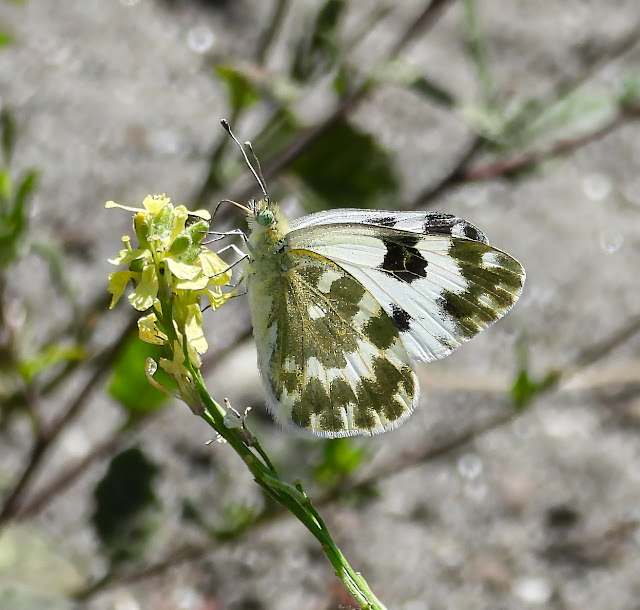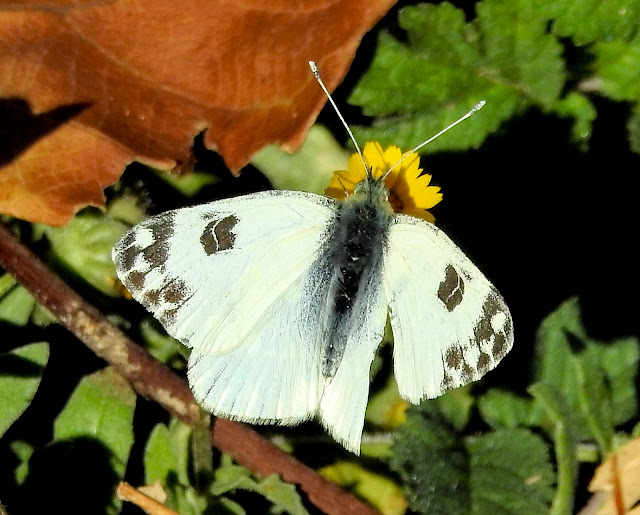Pontia daplidice, the Bath white, is a small butterfly of the family Pieridae, the yellows and whites, which occurs in the Palearctic region. It is common in central and southern Europe, migrating northwards every summer, often reaching southern Scandinavia and sometimes southern England.
This Blog contains Wildlife, Plants and Bird Photos from Walks, Safaris, Birding Trips and Vacations. Most of the pictures have been taken with my Nikon P900 and P950X cameras. Just click on any image for a larger picture. On the right column under the Blog Archive are the entries by date. Below that under Animal categories all the diffent species of Animals, Birds, Insects and Plants contained in the website are listed. Clicking on any entry will show all the entries for that species.
TOTAL PAGEVIEWS
TRANSLATE
Thursday, 19 June 2025
19-6-2025 MONTE CORONA, VALENCIA - BATH WHITE BUTTERFLY
Sunday, 1 June 2025
1-6-2025 MARJAL DEL BORRONS, GANDIA - BATH WHITE BUTTERFLY (Pontia daplidice)
Pontia daplidice, the Bath white, is a small butterfly of the family Pieridae, the yellows and whites, which occurs in the Palearctic region. It is common in central and southern Europe, migrating northwards every summer, often reaching southern Scandinavia and sometimes southern England.
The Bath white is a small white butterfly with a wingspan of 45 to 50 mm. The underside of the hindwing has a pattern of greenish blotches, which is characteristic of the Bath whites and easily identifies it from other pierids.
Sexes can be differentiated by markings on the forewing. The male is differentiated from the female by the markings on the upperside of the forewing. The apex of the forewing is black with white spots and lines. There is a black spot at the end of the cell. In the case of the female, there is an additional discal spot in 1b. The female also has an obscure row of terminal and marginal spots on the upper hindwing.
Sunday, 11 February 2024
7-5-2015 VILLALONGA RESERVOIR, VALENCIA - BATH WHITE BUTTERFLY (Pontia daplidice)
Pontia daplidice, the Bath white, is a small butterfly of the family Pieridae, the yellows and whites, which occurs in the Palearctic region. It is common in central and southern Europe, migrating northwards every summer, often reaching southern Scandinavia and sometimes southern England.
The Bath white is a small white butterfly with a wingspan of 45 to 50 mm. The underside of the hindwing has a pattern of greenish blotches, which is characteristic of the Bath whites and easily identifies it from other pierids.
Sexes can be differentiated by markings on the forewing. The male is differentiated from the female by the markings on the upperside of the forewing. The apex of the forewing is black with white spots and lines. There is a black spot at the end of the cell. In the case of the female, there is an additional discal spot in 1b. The female also has an obscure row of terminal and marginal spots on the upper hindwing.
Thursday, 28 September 2023
28-9-2023 PARADOR, TERUEL - BATH WHITE BUTTERFLY (Pontia daplidice)
Pontia daplidice, the Bath white, is a small butterfly of the family Pieridae, the yellows and whites, which occurs in the Palearctic region. It is common in central and southern Europe, migrating northwards every summer, often reaching southern Scandinavia and sometimes southern England.
The Bath white is a small white butterfly with a wingspan of 45 to 50 mm. The underside of the hindwing has a pattern of greenish blotches, which is characteristic of the Bath whites and easily identifies it from other pierids.
Sexes can be differentiated by markings on the forewing. The male is differentiated from the female by the markings on the upperside of the forewing. The apex of the forewing is black with white spots and lines. There is a black spot at the end of the cell. In the case of the female, there is an additional discal spot in 1b. The female also has an obscure row of terminal and marginal spots on the upper hindwing.








%2020-topaz-upscale-1.4x.jpg)


